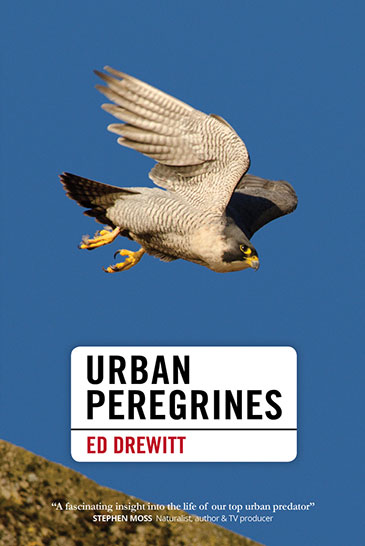Urban Peregrines by Ed Drewitt of the School of Biological Sciences, reveals the latest information on peregrine behaviour including how they are adapting to, and taking advantage of, the urban environment
The peregrine, the fastest bird in the world, has made a remarkable recovery over the past 30 years. As the species re-establishes itself around the world it is becoming a familiar sight in towns and cities.
This beautifully illustrated book is also a how-to guide, with information on finding peregrines, studying their diet, ringing individuals for research, putting up nest boxes and enabling people to learn more about them through public viewing points or web cameras.
The book also discusses what makes a peregrine urban, their contemporary relationship with people, and helps dispel some myths and reveal some truths about this agile predator.
Ed Drewitt said: "When I came to the University of Bristol to study zoology 16 years ago I really got into peregrines after I found they were living in the city. No-one else was studying them in any detail and I had the chance to look at what they eat in cities like Bristol, and find out who's who and where they travel too.
"The University's Wills Memorial Building was also a really important site for peregrines – they have never nested on it but they use it in the winter to rest and feed – so I used to find lots of wings, feathers and skulls from their prey there."
Urban Peregrines by Ed Drewitt is published by Pelagic, £24.99
Ed will be talking about the book on Saturday 21 June at 5pm on board Embercombe's Volharding, a Dutch sailing barge – one of the Books on the Boat series of talks and readings taking place during Bristol's Big Green Week 2014.
About the author
Ed Drewitt is a professional naturalist, wildlife detective and broadcaster for the BBC. He has been studying urban peregrines for over 15 years, and specialises in colour ringing their chicks and identifying what they have been eating.
After leaving the University of Bristol with a degree in zoology in 2001, Ed has worked as a learning officer for Bristol Zoo, the RSPB, the Recycling Consortium, Bristol Museum & Art Gallery, and most recently leading the learning programme for the Bristol Dinosaur Project at the University of Bristol, enabling others to learn about the City's very own dinosaur. Ed still works at the University training and mentoring postgraduates and staff so they better understand how to develop and deliver workshops in schools and for other students.
Praise for Urban Peregrines
"The diversity of material is marvellous: history, habits and full-on scientific analysis, opinion, even postulation and essential practical advice… it’s a feast of all things peregriney." Chris Packham, naturalist, author and TV presenter
"A fascinating insight into the life of our top urban predator." Stephen Moss, naturalist, author and TV producer
"Peregrines! The biggest urban conservation story to hit our cities is gloriously revealed in this wonderful book." Mike Dilger, TV presenter and naturalist
